
views
Having the Right Attitude

Be yourself. Many middle schoolers become self-conscious and insecure about things that make them different. But as long as your behaviors aren't harming anyone, you should feel free to express your individuality. Classmates may try to tease you about quirky clothing or unusual hobbies you like. Don’t let it get to you! If you learn to be confident in the things you like, it’s much harder to tease you about them.

Be confident. This is one of the most important components of becoming a more mature person. Work on developing self-esteem — love and accept yourself for who you are. Think confidently. Write down some of your talents and good attributes. Reflect on what your friends like about you. Think of activities you enjoy doing and how you contribute. Take a moment to feel good about these qualities! Write down the obstacles that stand in the way of your confidence. What are some bad thoughts you tend to have about yourself? Are they really logical? Are they a good reason to feel bad about yourself? It’s OK to want to work on certain things about yourself. You can still feel like a worthwhile, cool person at the same time. Look the part. Dress neatly each day, but don't be afraid to embrace your own style.

Accept personal responsibility. Recognize that while you can’t control what others may do, you are in control over your own actions and attitude. Understand things don’t simply happen to you. Your words and actions have consequences both for yourself and others. Accept responsibility when things go wrong. If you failed an exam, don’t blame your teacher. Sure, maybe they could have done some things better. But what actions could you have taken to get a better result? Try not to focus on things seem fair. Life isn’t always fair. Try to stay positive!
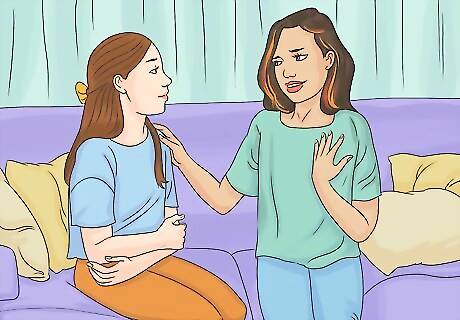
Be respectful of others. If you are intentionally annoying or inconsiderate of others’ feelings, people will view you as immature. Remember the needs and wants of other people around you. Are you prone to loud outbursts? Do you publicly embarrass other people? Try to recognize ways in which you may be unintentionally annoying others.
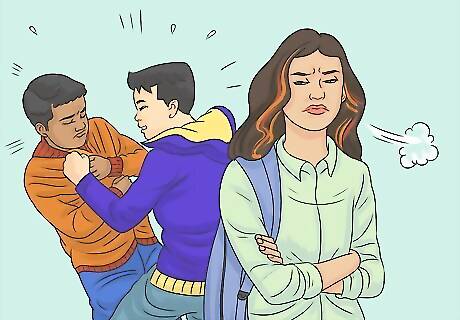
Control your temper. Keep your emotions in check and try not to overreact to minor things. When you feel yourself getting upset, take a moment to think about your response before you do or say anything. Reflect on what tends to make you angry. Maybe it’s a certain classmate with annoying habits. Try to think of a way to handle the situation without getting angry.
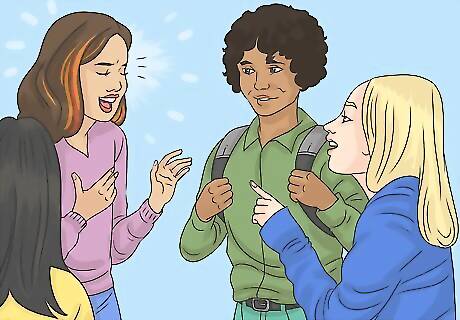
Keep your composure. It’s common for teenagers to publicly tease and embarrass each other. Remember that you’re in charge of your own reactions. It’s easier said than done, but try to maintain a sense of humor about yourself. Laughing at yourself allows others to laugh with you rather than at you. It also projects confidence. Even if you don’t find something funny, focus on not letting it upset you. People forget embarrassing incidents much faster than you’d think. Don’t worry about something haunting you forever. It’s unlikely to shape how people think of you if you don’t let it bother you.

Learn to accept criticism. Whether it’s schoolwork or a personal project, it can be hard to receive criticism on something you’ve worked hard on. But it’s an important step toward becoming a more productive, mature individual. Keep in mind that it’s not personal. Try not to get defensive or upset. Imagine a friend tells you a poem you wrote is a little too intense. It’s supposed to be intense, you might think. It’s upsetting that she’s not appreciating something you worked hard on. But take a step back. Try to understand where she’s coming from. Ask for more details. Being mature is something that is internal, not external. If you're having an issue, don't be afraid to reach out for help.
Developing Healthy Habits

Set goals and work toward them. Write down some of your current strengths and areas that you’d like to improve. Which of these are most important to you? Which are the most important for your future? Use these to construct clear goals for yourself. Once you have set goals, think of actions you can take to make them a reality.

Manage your time effectively. Developing good time management skills can help you reduce anxiety, make better decisions, and improve your performance. If you’re overwhelmed with homework, try making a plan before you get to work. List your tasks in order of importance. Which ones make the most sense to tackle first? Minimize distractions around you! Try being disciplined about putting your phone away and not checking social media. Creating good habits now will help you a lot in the long run. It can be helpful to work for 50 minutes, followed by a 10 minute break. Try coming up with a routine that works for you. Always be prepared for class. That will show your teachers and classmates that you are mature.
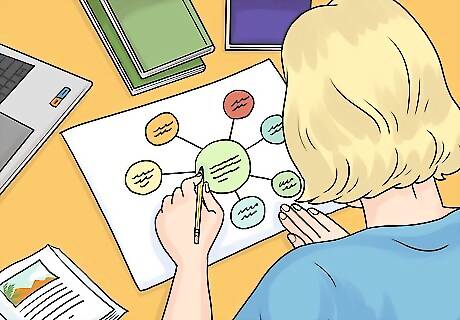
Develop good study habits. Many students don’t realize how much good habits can contribute to their success. Taking notes, making mind maps and researching independently are a few ways to make the most of the time you spend studying. Sometimes the answer is working smarter, rather than harder.

Start your day right. Many teens have trouble with stressful, rushed mornings becoming a regular occurrence. You can help things go smoothly by planning ahead. Pick out your outfit, accessories and any make-up the night before. Pack your bag with all your essentials. Now when you wake up in the morning, you’ll know exactly what you have to do.

Choose your friends wisely. Your friends can impact how you feel and act, so it's important to choose them wisely. Take care to surround yourself with people who bring out the best in you. Seek out people who offer emotional support and guidance. Consider if your relationships have a good balance of give and take. Most important, develop friendships with people you truly trust and respect.
Communicating Maturely
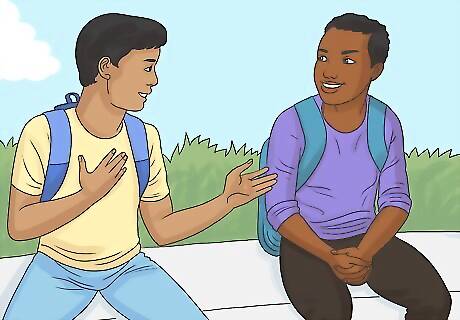
Be assertive. It’s important to be able to express your feelings and needs clearly, but without being cocky or arrogant. It’s also important to listen when others do the same. Practice communicating maturely, and you’re likely to feel more mature.

Get comfortable speaking with strangers. It’s easy to feel intimidated in social situations when you’re surrounded by people you don’t know. Remember, you are an interesting and cool person with worthwhile opinions and thoughts. There’s no reason not to join in the conversation. If you overhear something interesting, feel free to jump in with a question. This allows you to enter the conversation without derailing it.
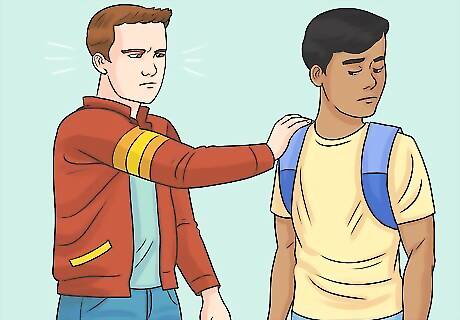
Avoid drama. You will inevitably encounter some hostility in middle school. Middle school drama is usually rooted in poor communication, unhealthy habits, and insecurities. You'll save yourself much trouble by learning to deal with negative situations in more mature ways. It’s hard to pick a fight with someone who doesn’t want to fight. When someone gets upset with you, do your best not to get upset as well. Communicate with them instead, and try to come up with a resolution.
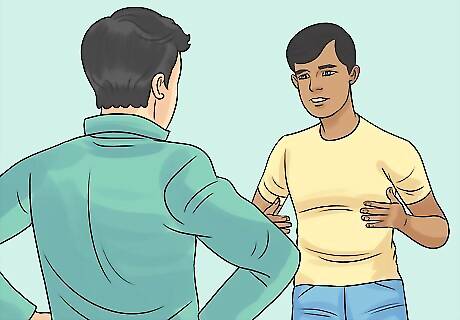
Be direct. If you find yourself in a negative situation, avoid the temptation to tell everyone you know how upset you are. Go straight to the source and attempt to talk to the person you’re having an issue with. Even when you or the other person is truly upset, it doesn’t have to be a hostile conversation. Calmly and clearly express why you're upset, then hear the other person out. You'll be amazed at the results. See this as an opportunity to work on your conflict resolution skills.
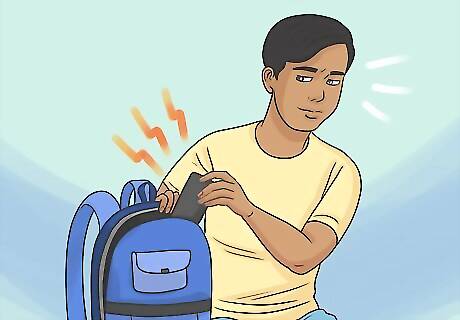
Don’t fight over text. When someone texts or IMs something you disagree with, it can be tempting to argue with them. Some people are habitual text-fighters and may try to provoke you. Don’t engage! Whenever possible, explain you’d rather discuss speaking in person or over the phone.
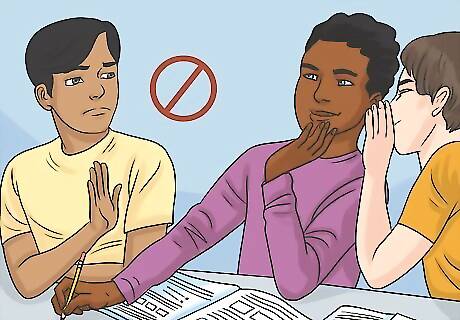
Avoid gossiping too much. In small doses, gossiping can be OK. But frequent gossipers tend to be less liked and less healthy. And even if you don’t do it maliciously, gossiping can do real damage. If your friends are always going on about people they dislike, try subtly changing the subject. Eventually, your friends will understand you’re not into talking about people behind their back. In time, they'll respect you more for it.



















Comments
0 comment